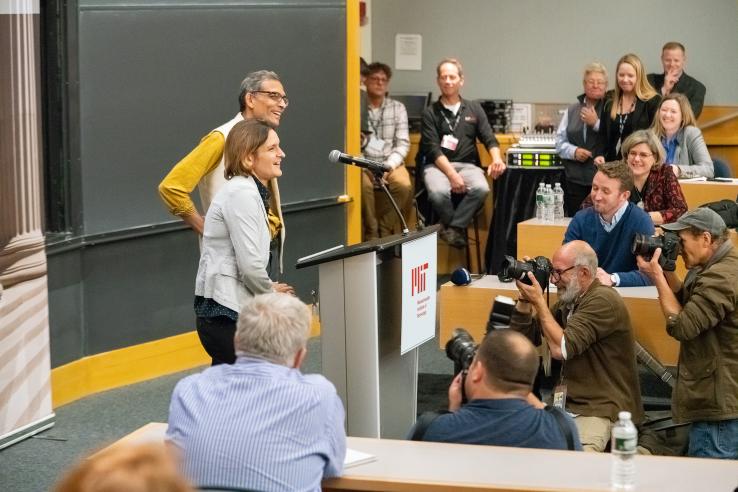November 2019 North America Newsletter

Good afternoon,
I was in the mountains of Montana with a patchy connection when the 2019 Economics Nobel Prize was announced. As the news that Abhijit Banerjee, Esther Duflo, and Michael Kremer received the Nobel spread across time zones, my phone kept buzzing. While I wasn’t with my J-PAL colleagues to toast the new laureates, I was incredibly inspired by the spirit of community and celebration resonating across the globe on their behalf. My notifications filled with pictures of people on nearly every continent raising a glass in celebration of “their” Nobel.
This spirit of community highlights something unique about randomized evaluations: They can’t be done in isolation by researchers alone. They rely on dedicated partners who are willing to invest in the learning process at all levels of operation. From the heads of NGOs and government agencies to the individual tutors and case managers implementing programs on the ground, our partners are both essential and extraordinary.
This is why we’re so excited to announce nine new partners through our State and Local Innovation and Work of the Future Initiatives. We’ll work with these remarkable agencies and organizations to design evaluations of their programs that range from systems to support jobseekers to methods to reduce opioid overprescription.
We’ve also been busy engaging with our partners in the research space at our annual Research Staff Training. This year’s training covered topics from data visualization to stakeholder engagement and equipped fifty research staff with the essential skills to capably design, implement, and manage randomized evaluations. There may have even been a future Nobel laureate in the bunch!
Mary Ann Bates
Executive Director, J-PAL North America
J-PAL Founders Win Nobel Prize in Economics
This October, J-PAL co-founders were awarded the 2019 Sveriges Riksbank Prize in Economic Sciences in Memory of Alfred Nobel. Over 20 years ago, Abhijit and Esther set out to answer some of the most highly debated questions in international development using the then-uncommon method of randomized evaluation. They have since reshaped the development economics field. This prize recognizes the innovation and urgency that underlie the collective efforts of J-PAL and our many partners to reduce poverty by using rigorous evidence. The past few weeks have been both energizing and humbling for the J-PAL North America team and our partners as we work to grow our impact and apply our founders’ vision here at home. See additional coverage on the Nobel Prize from The New York Times, BBC, and NPR.
Nine New Partners Join J-PAL North America to Generate Evidence on Effective Programs
J-PAL North America has a partner-centered model to develop rigorous evaluations. This approach draws directly from the policy priorities identified by our partners. This month, our State and Local Innovation Initiative announced five new state and local government partners. With support from J-PAL, these government partners will work to design rigorous evaluations of innovative anti-poverty policies they have prioritized, ranging from combatting the overprescription of opioids to reducing failures to appear in court. This cohort joins 13 state and local government partners selected through previous rounds of the State and Local Innovation Initiative. The Work of the Future Initiative selected four partners in its inaugural round. These partners come from the public, private, and nonprofit sectors and all seek to rigorously evaluate programs aimed at supporting workers in the face of the shifting labor market.
J-PAL North America Hosts Research Staff Training in New Hampshire
Capacity building is a core component of J-PAL’s work to expand the use of evidence. Since 2003, J-PAL has hosted more than 305 training courses and trained more than 2,600 people on topics that range from evaluation design to the use of evidence to improve policy. Last month, J-PAL North America’s Research and Training team hosted nearly fifty research staff in Greenfield, New Hampshire to equip the next generation of researchers with essential skills for designing and implementing randomized evaluations. Research staff attended in-depth sessions covering technical skills, data collection and measurement, stakeholder management and communication, project management, and research ethics. To see what these capacity building trainings look like in practice, this blog post provides snapshots of last year’s research staff training in New Hampshire, as well as our training run by the J-PAL South Asia office in Goa.